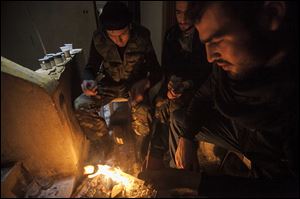
Syrian rebels create new unified military command
Syrian rebels create new unified military command structure in fight against regime
12/8/2012
Syrian rebels make a fire to keep warm after clashes with troops loyal to Syrian President Bashar Assad at on the front line in Aleppo, Syria.
BEIRUT — Syrian rebel commanders have elected a new 30-member leadership council and a chief of staff, a senior rebel said Saturday in a major step toward unifying the opposition that is fighting to oust President Bashar Assad.
The Supreme Military Council, which was chosen Friday during a meeting in Turkey, will work with the political leadership that was chosen last month in Qatar.
But the al-Qaida inspired group Jabhat al-Nusra, was excluded, the rebel official said, as the rebels apparently move to sideline the extremists who have proven skilled fighters but raised concerns among Western allies.
The announcement came as the Syrian Foreign Ministry claimed that anti-government forces might use chemical weapons, saying rebels have recently captured a chlorine processing plant east of the northern city of Aleppo. The warning was made in a letter to the U.N. Security Council and U.N. chief Ban Ki-moon.
The rebel official, a senior member of the main rebel group the Free Syrian Army, said more than 550 rebel commanders and representatives began meeting Wednesday in the Turkish resort of Antalya. He spoke on condition of anonymity because he was not authorized to reveal the meeting's outcome.
The fight to oust Assad has long been hobbled by the opposition's inability to forge a united front and command structure. The move was the most serious attempt by the rebels, who are backed by Saudi Arabia, Qatar and Turkey, to fix that.
If successful, it could be a turning point in the conflict as the rebels close in on the capital Damascus, Assad's seat of power.
“The aim of this meeting was to unify the armed opposition to bring down the regime,” said another rebel commander from the Damascus areas who attended the meeting. “It also aims to get the situation under control once the regime falls.”
The local commander, who also spoke on condition of anonymity for security reasons, added that the rebels command decided to divide Syria into five regions that will be under the command of the assistants of the FSA chief of staff.
Brig. Gen. Salim Idriss was named as the group's chief of staff, according to the official in Antalya. Idriss is a former army general who defected and joined the opposition and played a role in the fighting on the ground in the past months, he said.
Brig. Gen. Mustafa al-Sheikh, who headed the FSA's Military Council, was removed from his post and will play no role in the future, the FSA official said. He added that the group's main commander Riad al-Asaad will continue to hold the title, but it will be largely symbolic.
The rebels said that Jabhat al-Nusra was not invited to the meetings and is not part of the new command. The Damascus commander said the rebel group Ahrar al-Sham or the Free People of Damascus also was not invited.
Jabhat al-Nusra is known to include many foreign fighters while Ahrar al-Sham is mostly made up of hard-line Islamists.
The FSA command appears to want to sideline extremist groups that have been playing a bigger role in recent months.
On Wednesday, a U.S. official said the Obama administration is preparing to designate Jabhat al-Nusra as a foreign terrorist organization. The step will freeze any assets that members have in U.S. jurisdictions and bar Americans from providing the group with material support.
Separately, the Syrian regime reiterated its insistence that it would not use chemical weapons “if it has them under any circumstances because it is defending its people,” according to the letter sent to the U.N. It was carried by the state-run news agency, SANA.
Syria has never confirmed it has chemical weapons. But it is believed to possess substantial stockpiles of mustard gas and a range of nerve agents, including sarin, a highly toxic substance that can suffocate its victims by paralyzing muscles around their lungs.
No rebels are known to have access to these weapons and it is highly unlikely that they know how to operate them.
But the foreign ministry claimed “terrorist groups” — the term it uses for the rebels — recently captured a chlorine plant and warned they “might resort to the use of chemical weapons against Syrians.”
The claim could not be independently verified. The opposition has not commented on the report.
In the Gulf nation of Bahrain, British Foreign Secretary William told a security conference that he had seen “some evidence” that Syria is preparing to use chemical weapons against rebels.”
The Foreign Secretary declined to give details of the intelligence, but again warned Assad's regime would face action if they were deployed.
Asked about Syrian chemical weapons, he said “we do have contingency plan on this I am sorry I am not going on details.”
Also Saturday, the Britain-based Syrian Observatory for Human Rights said rebels and troops continued fighting around the Damascus International Airport, south of the capital. The battle around the airport began last week.
State-run Syrian TV said Assad's army is “continuing its operations” in the suburbs of Damascus and killed a number of “terrorists.”
In the north, a Syrian jet bombed the town of Tal Abyad near the border with Turkey, and rebels responded with anti-aircraft fire, the Turkish state-run Anadolu Agency reported. A plume of smoke could be seen rising from Tal Abyad, it said. No casualties were reported.
Residents at the Turkish border town of Akcakale were told to keep away from the frontier region. On Oct. 3, a shell from the fighting struck a house in the town, killing five people and prompting Turkey to launch retaliatory strikes at Syria.
____
Associated Press writer Suzan Fraser contributed to this report from Ankara, Turkey.